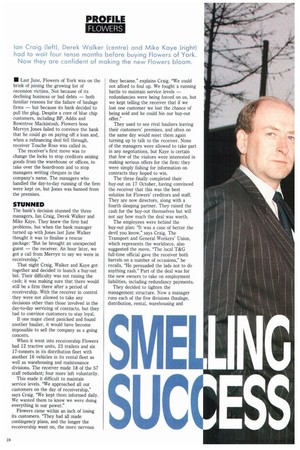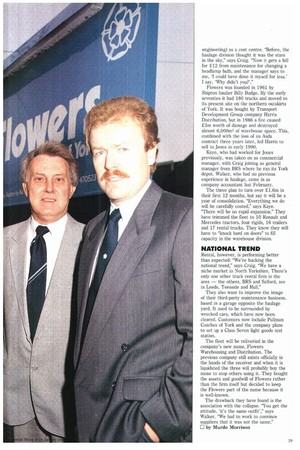Ian Craig (left), Derek Walker (centre) and Mike Kaye (right)
Page 30

Page 31

If you've noticed an error in this article please click here to report it so we can fix it.
had to wait four tense months before buying Flowers of York. Now they are confident of making the new Flowers bloom.
• Last June, Flowers of York was on the brink of joining the growing list of recession victims. Not because of its declining business or bad debts — both familiar reasons for the failure of haulage firms — but because its bank decided to pull the plug. Despite a core of blue chip customers, including BP, Addis and Rowntree Mackintosh, Flowers boss Mervyn Jones failed to convince the bank that he could go on paying off a loan and, when a refinancing deal fell through, receiver Touche Ross was called in.
The receiver's first move was to change the locks to stop creditors seizing goods from the warehouse or offices, to take over the boardroom and to stop managers writing cheques in the company's name. The managers who handled the day-to-day running of the firm were kept on, but Jones was banned from the premises.
STUNNED
The bank's decision stunned the three managers, Ian Craig, Derek Walker and Mike Kaye. They knew the firm had problems, but when the bank manager turned up with Jones last June Walker thought it was to finalise a rescue package: "But he brought an unexpected guest — the receiver. An hour later, we got a call from Mervyn to say we were in receivership."
That night Craig, Walker and Kaye got together and decided to launch a buy-out bid. Their difficulty was not raising the cash; it was making sure that there would still be a firm there after a period of receivership. With the receiver in control they were not allowed to take any decisions other than those involved in the day-to-day servicing of contracts, but they had to convince customers to stay loyal.
If one major client panicked and found another haulier, it would have become impossible to sell the company as a going concern.
When it went into receivership Flowers had 12 tractive units, 23 trailers and six 17-tonners in its distribution fleet with another 16 vehicles in its rental fleet as well as warehousing and maintenance divisions. The receiver made 18 of the 57 staff redundant; four more left voluntarily.
This made it difficult to maintain service levels. "We approached all our customers on the day of receivership," says Craig. "We kept them informed daily. We wanted them to know we were doing everything in our power."
Flowers came within an inch of losing its customers. "They had all made contingency plans, and the longer the receivership went on, the more nervous they became," explains Craig. "We could not afford to foul up. We fought a running battle to maintain service levels — redundancies were being forced on us, but we kept telling the receiver that if we lost one customer we lost the chance of being sold and he could bin our buy-out offer."
They used to see rival hauliers leaving their customers' premises, and often on the same day would meet them again turning up to talk to the receiver. None of the managers were allowed to take part in any negotiations, but Kaye is certain that few of the visitors were interested in making serious offers for the firm: they were simply fishing for information on contracts they hoped to win.
The three finally completed their buy-out on 17 October, having convinced the receiver that this was the best solution for Flowers' creditors and staff. They are now directors, along with a fourth sleeping partner. They raised the cash for the buy-out themselves but will not say how much the deal was worth.
The employees were behind the buy-out plan: "It was a case of better the devil you know," says Craig. The Transport and General Workers' Union, which represents the workforce, also suggested the move. "The local T&G full-time official gave the receiver both barrels on a number of occasions," he recalls. "He persuaded the lads not to do anything rash." Part of the deal was for the new owners to take on employment liabilities, including redundancy payments.
They decided to tighten the management structure. Now a manager runs each of the five divisions (haulage, distribution, rental, warehousing and
engineering) as a cost centre. "Before, the haulage division thought it was the stars in the sky," says Craig. "Now it gets a bill for E12 from maintenance for changing a headlamp bulb, and the manager says to me, 'I could have done it myself for less.' I say, 'Why didn't you?'."
Flowers was founded in 1961 by Shipton haulier Billy Budge. By the early seventies it had 180 trucks and moved to its present site on the northern outskirts of York. It was bought by Transport Development Group company Harris Distribution, but in 1986 a fire caused E3m worth of damage and destroyed almost 6,000m2 of warehouse space. This, combined with the loss of an Asda contract three years later, led Harris to sell to Jones in early 1990.
Kaye, who had worked for Jones previously, was taken on as commercial manager, with Craig joining as general manager from BRS where he ran its York depot. Walker, who had no previous experience in haulage, came in as company accountant last February.
The three plan to turn over £1.6m in their first 12 months, but say it will be a year of consolidation. "Everything we do will be carefully costed,” says Kaye. "There will be no rapid expansion." They have trimmed the fleet to 10 Renault and Mercedes tractors, four rigids, 16 trailers and 17 rental trucks. They know they will have to "knock hard on doors" to fill capacity in the warehouse division.
NATIONAL TREND
Rental, however, is performing better than expected: "We're bucking the national trend," says Craig. "We have a niche market in North Yorkshire. There's only one other truck rental firm in the area — the others, BRS and Salford, are in Leeds, Teesside and Hull."
They also want to improve the image of their third-party maintenance business, based in a garage opposite the haulage yard. It used to be surrounded by wrecked cars, which have now been cleared. Customers now include Pullman Coaches of York and the company plans to set up a Class Seven light goods test station.
The fleet will be reliveried in the company's new name, Flowers Warehousing and Distribution. The previous company still exists officially in the hands of the receiver and when it is liquidated the three will probably buy the name to stop others using it. They bought the assets and goodwill of Flowers rather than the firm itself but decided to keep the Flowers part of the name because it is well-known.
The drawback they have found is the association with the collapse. "You get the attitude, 'it's the same outfit'," says Walker. "We had to work to convince suppliers that it was not the same." El by Murdo Morrison
































































